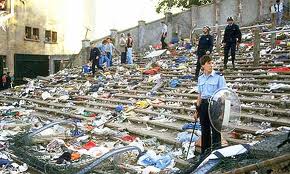By David Owen
January 4 – Hundreds of pages of documents relating to the British Government’s handling of the football hooliganism problem before and after the Heysel Stadium disaster in Brussels in May 1985 have been released by the National Archives.
Among the inclusions is an 18-point memo to Prime Minister Margaret Thatcher from Sir Bernard Ingham, her chief press secretary, dated some three weeks after the disaster and addressing the “public relations/presentational aspects” of the approaching 1985-86 football season.
After emphasising the need to “implant in the public’s mind” that 1984-85 was “the low water mark for British soccer; enough is enough”, point 11 outlines an idea for a “Goalies against Hoolies” campaign, utilising “the more articulate goalkeepers”. The memo proposes that Thatcher “should give an interview to Gary Bailey, Manchester United and England goalkeeper”. Bailey, the memo points out, is “an articulate graduate”.
The document continues: “Elton John, chairman of Watford, has suggested an interview with Bailey. But all the glamorous pop names in soccer have a role to play in getting the right approach to next season, and we should consider organising the main radio and television sports programmes to get as many of them on the air as possible immediately before the season to spread the word…
“David Davies, a curious animal in that he is both a political and football correspondent, has asked you to give a pre-season interview to BBC Grandstand on a Saturday lunchtime. I think you should do this early in August before you go on holiday, and also give one to ITV’s World of Sport.”
The files also contain correspondence from Ian Wooldridge, the esteemed Daily Mail sportswriter of the era, following a “memorably enjoyable dinner and party” with the Thatchers on what appears to have been 5 June 1985, exactly a week after the disaster.
Offering his “considered thoughts” on the state of English football, the writer expresses the view that some football officials “still do not comprehend the infinite damage Brussels has done to our country”.
He goes on: “Football’s economics, due to mismanagement, are in a disastrous state. They will become even worse…if the war between TV and Soccer continues…If the game is not to be decimated, the impasse between TV and Soccer needs to be broken urgently…The BBC and ITV will not raise their offers rejected on February 14.”
A summary of football finance elsewhere in the files indicates that the Football League received just £3.1 million from TV companies for screening league matches in 1984-85, “including £0.5 million for showing matches overseas”. Gross wages to all top-tier players for the entire season were put at £13 million.
A letter from Environment and Sports Minister Neil Macfarlane to MCC President George Mann, meanwhile, suggests that the Government also had some concerns about cricket. Alluding to “the worrying developments in crowd behaviour at some cricket matches”, Macfarlane argues that “events such as the Lord’s Test could become targets for that tiny fringe element which disfigures sport by its rowdy and unpleasant behaviour. I would strongly recommend that alcohol sales be restricted, if not stopped altogether.”
The Heysel disaster occurred before the European Cup final between Liverpool and Juventus on 29 May 1985. A total of 39 people were killed, the majority Italian. The incident led to a five-year ban for English clubs from European competition.
The newly released files may be accessed here: moc.l1745123657labto1745123657ofdlr1745123657owedi1745123657sni@n1745123657osloh1745123657cin.l1745123657uap021745123657">http://www.nationalarchives.gov.uk/about/news/newly-released-files-1985-1986/prime-ministers-office-files-prem-1985/#Home%20affairs
Contact the writer of this story at moc.l1745123657labto1745123657ofdlr1745123657owedi1745123657sni@n1745123657osloh1745123657cin.l1745123657uap1745123657

